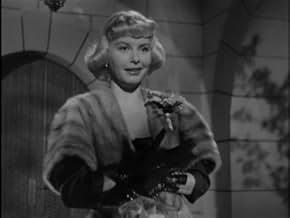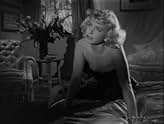In 1940s Chicago, a young black man takes a job as a chauffeur to a white family, which takes a turn for the worse when he accidentally kills the teenage daughter of the couple and then trie... Read allIn 1940s Chicago, a young black man takes a job as a chauffeur to a white family, which takes a turn for the worse when he accidentally kills the teenage daughter of the couple and then tries to cover it up.In 1940s Chicago, a young black man takes a job as a chauffeur to a white family, which takes a turn for the worse when he accidentally kills the teenage daughter of the couple and then tries to cover it up.
- Awards
- 1 win & 2 nominations total
Jorge Rigaud
- Ralph Farley
- (as George Rigaud)
George D. Green
- Panama
- (as George Green)
Willa Pearl Curtis
- Hannah Thomas
- (as Willa Pearl Curtiss)
Ruth Roberts
- Helen Dalton
- (as Ruth Robert)
Georges Roos
- Scoop
- (as George Roos)
Featured reviews
Piere Chenal was a specialist of crime movies since the 30's but never directed a masterpiece (except "La Foire Aux Chimères, still not available on DVD) but all his movies were intelligently shot and "Le Dernier Tournant" (first movie adaptation of "The Postman Always Rings Twice") was admired by Orson Welles. During WWII and after, Pierre Chenal shot in Argentina some nice crime movies. "Native Son" was adapted and played by his author, Richard Wright, and shot first in Chicago then in Argentina. The movie had some success in south American countries but did nothing in USA where 40 minutes were cut. Richard Wright never saw the final cut. Pierre Chenal didn't want that cut print to be exploited in Europe. In the 80's, a 90 minutes print was found and exploited. If you want to know more about this very strange shooting, I advise you to read the six pages comments by Pierre Chenal in the book "Pierre Chenal" (collection 24 souvenirs / seconde). You will discover a very bright director and maybe want to discover his movies.
A flawed but ultimately important 1951 adaptation of the seminal Richard Wright classic which he co-scripted & inexplicably starred in (?). Wright plays Bigger Thomas, a spiteful & angry black man living in the slums in Chicago (actually filmed in South America) w/his mother & younger brother & sister. Hoping to derail him from his path to infamy, a confidante of the family recommends him to become a chauffeur for a rich white family where he'll live & work from. There he meets the family's dangerous daughter who is more than willing to corrupt poor Bigger as she has him drive her & her boyfriend, an unabashed lefty w/revolutionary leanings, around as they drink winding up at a black club where Bigger's singer/girlfriend is debuting. Wrapping up the night, Bigger has to navigate the clearly overly intoxicated daughter to her room stirring the attention of her blind grandmother which sends Bigger into a panic whereby he accidentally kills her when he smothers her w/a pillow (to prevent her from exposing him). To make matters worse he chooses to dispose of the body in the home's incinerator & blames her apparent disappearance on the boyfriend. As tensions mount & a flurry of reporters descend on the manse to stay on top of the kidnapping angle Bigger has concocted, one journalist in particular continues to prod Bigger until the remains of the dead woman are found sending him fleeing w/his girl into the inner city slums to evade capture where things only get worse. If you can overcome the bad acting, obvious un-American locations, & colossally miscast Wright (who was in his 40's playing a someone in his 20's) then the social issues & inherent racism of the time makes sense why this wretched character, who is devoid of getting our sympathies, still does anyway making this black film noir (it was presented last week on TCM's Noir Alley w/Eddie Muller) a must for all to see.
Imagine, if you will, J.D. Salinger playing Holden in a film adaptation of "Catcher In The Rye" or Lillian Hellman essaying Regina in "Little Foxes" instead of Bette Davis and you have some idea of the sheer awfulness of watching Richard Wright, actor, (as opposed to reading Richard Wright, writer), as he first hijacks and then smothers this film in a pillow of amateurishness. In this endeavor he is ably assisted by Gloria Madison as his girlfriend. Indeed the scenes featuring the two of them display the worst acting by a male/female duo, well, ever. Give it a D plus. PS...Little attempt is made to convince the viewer that he or she is not in Buenos Aires. How else to account for the plethora of palm trees in background shots?
Richard Wright's novels are famous in France.When he had to escape from his native land in the McCarthy years he lived in Sartre's and Camus' country .So it was only natural that the first version of his "native son" was filmed by a French.Pierre Chenal was not a beginner when he made "Native Son" aka " Sangre Negra"-it was actually made in Argentina- he considers his best work.But Chenal had already succeeded in the Film Noir genre:he was the first to adapt for the screen "the postman always rings twice" (Le Dernier Tournant) and "La Foire Aux Chimères " (starring Von Stroheim,one of his favorite actors) was his towering achievement.
Not only Wright adapted his own novel but he also played the part of Bigger.This is rather a mistake ,for Bigger is supposed to be about 25 and the novelist was in his forties and it shows.But it's interesting because it's very rare that a writer becomes an actor in one of his stories (another example is Erich Maria Remarque in Sirk's "a time to live and a time to die" ,but the German writer had a small supporting role).The budget was certainly rather low and the director is to be commanded for he made the best of it,particularly in the scene of Mary's "murder" and in the sequence of the nightmare (the cotton field and the building near decay where Bigger and his girlfriend are hiding). The movie is rather short (90min) and some of the aspects of the novel are botched : Mary and her boyfriend ,who are activist students ,want Bigger to join the union ,and the fiancé gives him "books" which are probably not politically correct,all this is only skimmed over.The Dalton family is a human one ,and Wright ,who was an "Uncle Tom"'s grandchild (his grandparents were slaves) does not make them the bad guys .Bigger is a victim of fate ,and of his condition:had he been white he would not have killed ,he never meant to do it.
As Leonard Maltin wrote ,it was defeated by its low budget.The 1986 remake,starring Victor Love,Elizabeth McGovern and Matt Dillon is pretty good .Both versions are worth a look.
Not only Wright adapted his own novel but he also played the part of Bigger.This is rather a mistake ,for Bigger is supposed to be about 25 and the novelist was in his forties and it shows.But it's interesting because it's very rare that a writer becomes an actor in one of his stories (another example is Erich Maria Remarque in Sirk's "a time to live and a time to die" ,but the German writer had a small supporting role).The budget was certainly rather low and the director is to be commanded for he made the best of it,particularly in the scene of Mary's "murder" and in the sequence of the nightmare (the cotton field and the building near decay where Bigger and his girlfriend are hiding). The movie is rather short (90min) and some of the aspects of the novel are botched : Mary and her boyfriend ,who are activist students ,want Bigger to join the union ,and the fiancé gives him "books" which are probably not politically correct,all this is only skimmed over.The Dalton family is a human one ,and Wright ,who was an "Uncle Tom"'s grandchild (his grandparents were slaves) does not make them the bad guys .Bigger is a victim of fate ,and of his condition:had he been white he would not have killed ,he never meant to do it.
As Leonard Maltin wrote ,it was defeated by its low budget.The 1986 remake,starring Victor Love,Elizabeth McGovern and Matt Dillon is pretty good .Both versions are worth a look.
This movie had an incredibly troubled history. Hollywood would not touch Native Son even during its brief 1940s flirtation with liberalism. A 1944 Orson Welles stage production with Canada Lee playing the teen-aged gang member Bigger Thomas, though critically successful, had been quashed by the Catholic Legion of Decency. Wright's novel was sold through the Book of the Month -- its first African-American author -- and won incredible notices. It also scared the daylights out of mainstream white culture. He sympathetically portrayed an African-American murderer (the Legion's stated complaint about the play), unambiguously showed white female desire for a black male and gave a rather jaundiced view of the left-wing, jazz-loving bohemia hidden among the youth of the very wealthy. (And by portraying the thrill seekers of the left as merely that, Wright also alienated many of his Communist and left-wing friends.) It was all too much for Hollywood. Still, a number of people tried to get a film of the play made independently with Canada Lee eventually opting to shoot in Argentina with a French director (not Welles). However, Lee couldn't get out of the U.S. (Oddly enough, he and Sidney Poitier were sneaked into Apartheid South Africa as indentured servants that year so they could appear in Zoltan Korda's masterful adaption of Cry, The Beloved Country.) At the last minute, Wright was called upon to play the lead role and he is terrible! The great writer could not act. He does the one thing a serious black actor should never do -- he pops his eyes constantly. In fairness, the production values are outstanding. This is basically a crime story with a racial subtext and Chenel nails the film noir ambiance. Unfortunately, the supporting actors are Argentinian with Americans dubbing their voices. And there's Wright, already over 40 -- too old to play bigger teenager Thomas -- popping his eyes. When I saw this screened at the AFI, Stanley Crouch, who had written a laudatory essay about the film, spoke afterwords. I seriously wondered if he had seen the movie before he wrote about it. Crouch mumbled throughout his question and answer session and the audience kept telling him to speak louder. The movie deserves preservation simply because of its historic significance but not a wide audience. Read the novel instead.
Did you know
- TriviaCanada Lee was set to star as Bigger Thomas (He had shot to fame in Orson Welles's Broadway production of Native Son.), but he was stuck in limbo with South African customs agents during the filming of Pleure, ô pays bien-aimé (1951), not to mention his failing health eventually caused Lee to back out of the project.
- GoofsWhen Bigger is at the beach with Bessie, a twin-engine prop plane flies overhead, but the sound of jet engines is heard.
- ConnectionsReferenced in Biography: Dorothy Dandridge: Little Girl Lost (1999)
- How long is Native Son?Powered by Alexa
Details
- Release date
- Countries of origin
- Official sites
- Language
- Also known as
- Native Son
- Filming locations
- Production company
- See more company credits at IMDbPro
- Runtime
- 1h 44m(104 min)
- Color
- Aspect ratio
- 1.37 : 1
Contribute to this page
Suggest an edit or add missing content

























